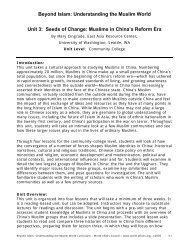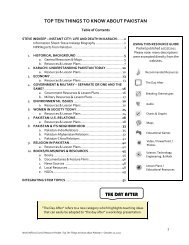The Japanese Approach to Environmental Issues - World Affairs ...
The Japanese Approach to Environmental Issues - World Affairs ...
The Japanese Approach to Environmental Issues - World Affairs ...
Create successful ePaper yourself
Turn your PDF publications into a flip-book with our unique Google optimized e-Paper software.
WaterWATER ENVIRONMENTAL MANAGEMENT IN JAPANhttp://www.env.go.jp/en/water/wq/pamph/index.htmlThis website, sponsored by Japan’s Ministry of the Environment, details the country’s his<strong>to</strong>ry,policies, and ongoing concerns regarding water management.JAPAN SOCIETY ON WATER ENVIRONMENThttp://www.jswe.or.jp/index-e.html<strong>The</strong> objective of this Society is <strong>to</strong> contribute <strong>to</strong> the conservation and the creation of a sound waterenvironment through research and dissemination of knowledge concerning the water environmentand related fields. Additionally, we aim <strong>to</strong> contribute <strong>to</strong> the development of a scientific culture inthese fields.JOURNAL OF WATER AND ENVIRONMENTAL TECHNOLOGYhttp://www.jstage.jst.go.jp/browse/jwetAn electronic academic journal published by the Japan Society on Water Environment.WATER ENVIRONMENT PARTNERSHIP IN ASIA (WEPA): STATE OF WATERENVIRONMENTAL ISSUES – JAPAN (2005)http://www.wepa-db.net/policies/state/japan/japan.htm<strong>The</strong> reinforced effluent regulations for fac<strong>to</strong>ries have been effective in improving water quality, butproblems with domestic effluent remain and efforts <strong>to</strong> improve this situation have lagged because of,for example, insufficient sewage treatment system infrastructure. In addition <strong>to</strong> physicalcharacteristics of enclosed or semi-enclosed water bodies, such as low water turnover rates, anotherimportant fac<strong>to</strong>r contributing <strong>to</strong> water quality problems is concentration of people and industries inthese catchment areas.STATE OF JAPAN’S ENVIRONMENT AT A GLANCE: WATER POLLUTIONhttp://www.env.go.jp/en/water/wq/pollution/index.htmlRemarkable improvements have been made over recent years in water quality in Japan, owing <strong>to</strong>significant reduction of pollution by heavy metals, as a result of regulations on industrial wastewater.On the other hand, environmental quality standards for organic pollution are still not being met atabout 30 percent of Japan’s <strong>to</strong>tal water area.MINISTRY OF THE ENVIRONMENT: CONSERVATION OF MARINEENVIRONMENThttp://www.env.go.jp/en/earth/marine/conservation.html<strong>The</strong> annual number of reported marine pollution incidents in the coastal areas of Japan has remainedat approximately seven <strong>to</strong> nine hundred in recent years; half are oil-related incidents. In 1996, marinepollution caused by oil spill <strong>to</strong>taled 370 cases, including 299 cases of oil spill from vessels. Amongthese, eighty-six cases were committed intentionally and ninety-one were the result of carelesshandling. Incidents caused by land-based sources numbered 179 and most of them were committedintentionally.WhalingWORLDWATCH INSTITUTE: CAN JAPAN CONVINCE INTERNATIONALCOMMUNITY TO SUPPORT ‘SUSTAINABLE’ WHALING? (Feb. 22, 2008)http://www.worldwatch.org/node/5628<strong>The</strong> International Whaling Commission’s seventy-eight members are meeting in London next monthin an effort <strong>to</strong> reach agreement on whale conservation rules. Meanwhile, global whale huntingcontinues <strong>to</strong> increase.14











